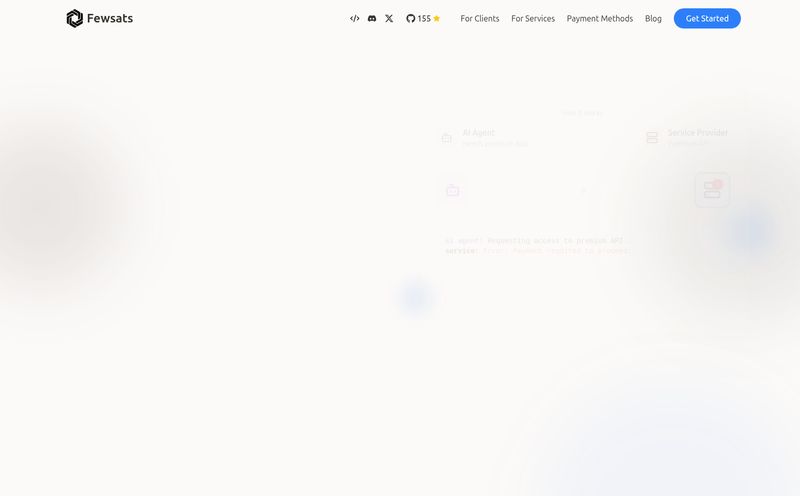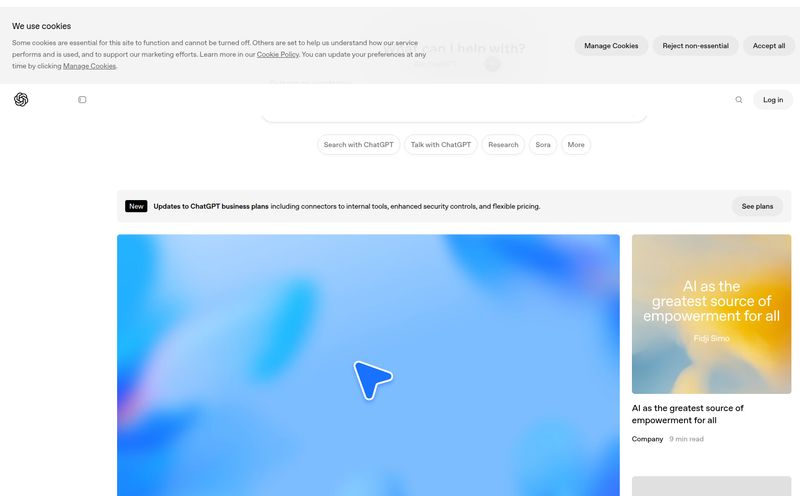As someone who’s been neck-deep in the digital marketing and productivity space for years, I've seen countless apps rise and fall. It’s a bit of a hobby of mine, actually. I'm a sucker for a new to-do list or a revolutionary calendar. I’ve tried them all, from the sprawling ecosystems of Notion and Asana to the minimalist charm of a simple text file. So when I first heard about Weedone, my interest was definitely piqued.
The pitch was perfect. An AI-powered tool designed around the principle of monotasking. In a world that glorifies the chaotic mess of multitasking, the idea of an app that helps you do less but better felt like a breath of fresh air. It promised to use AI to help you set weekly OKRs (Objectives and Key Results), manage your tasks, and keep you focused. Sounds pretty great, right? A digital zen master for your workflow.
But then, things got weird. Like a digital ghost story, the app seems to have… vanished. More on that in a bit.
The Alluring Promise of AI-Powered Monotasking
Let's first talk about why an app like Weedone was so appealing. The core idea was built on monotasking theory. We all know that feeling of having 17 tabs open, notifications pinging, and a to-do list that looks more like a novel. It’s a recipe for burnout, not brilliance. I’ve always felt that true productivity isn't about how many things you can juggle, but how deeply you can focus on one important thing at a time.
Weedone was supposed to be the cure for this digital sickness. It aimed to cut through the noise, using artificial intelligence to help you identify what truly matters for the week and guiding you to completion. Less busywork, more meaningful progress. A noble goal, and one that resonates with anyone who's ever ended a frantic 10-hour workday wondering what they actually accomplished.
Breaking Down the Weedone Features (In Theory)
So, what was under the hood of this promising platform? Based on the information that floated around, it had a few standout features that made it more than just another checklist app.
Your AI-Powered OKR Co-Pilot
This was the star of the show. Instead of you just staring at a blank slate on Monday morning, Weedone's AI was meant to help you generate your weekly Objectives and Key Results. Think of it as a strategic partner, helping you align your daily tasks with your bigger goals. At the end of the week, it would even generate a summary. For small teams or solo entrepreneurs who don't have a dedicated project manager, this could have been a game-changer.
The “Weed Collector” - Taming the Brain Dump
I love this name. We all have those random ideas, tasks, and reminders that pop into our heads at the worst times. The “Weed Collector” was designed as a quick-capture inbox for these thoughts. A place to dump them without derailing your current focus. Later, you could sort through your 'weeds' and decide what was important enough to become a proper task. It’s a fantastic metaphor—pulling the weeds from the garden of your mind to let the important stuff grow. Brilliant.
The Pomodoro Timer and Deep Work
A classic for a reason. Weedone integrated a Pomodoro timer, the tried-and-true method of working in focused 25-minute sprints with short breaks. By baking this directly into the app, it encouraged a rhythm of deep work and recovery, preventing you from just plowing through your list until you hit a wall. It’s a simple feature but one that shows a real understanding of human psychology and focus.
So, Where Did Weedone Go? A Digital Ghost Story
Okay, so we have this amazing-sounding app. AI-driven, focused on monotasking, with clever features and a solid philosophy. I was ready to give it a try. I went to their website, weedone.app, and was greeted by… this:

Visit Weedone
Yep. The domain is for sale. That’s the digital equivalent of showing up to a restaurant for your reservation and finding an empty lot. A real head-scratcher.
What happened here? My inner SEO detective has a few theories:
- A Pre-Launch Flameout: This could have been a promising project that simply ran out of cash or manpower before it ever truly launched to the public. It happens more often than you'd think in the startup world.
- An Acquisition and Shutdown: Sometimes a larger company will buy a smaller one for its talent or technology and then shut down the original product. A so-called 'acqui-hire'.
- A Rebrand: It's possible the team decided the name wasn't working (the potential for… other interpretations of “Weedone” is there) and they’ve relaunched under a new identity. But if so, they didn't leave a forwarding address.
Whatever the reason, it's a bit of a bummer. It serves as a good reminder that in the fast-moving tech space, even the most promising ideas can disappear overnight.
The Pros and Cons We Can Only Imagine
Based on its on-paper promise, we can still piece together what would have been the strengths and weaknesses of Weedone.
On the plus side, the AI-powered goal setting would have been a massive draw. The sharp focus on monotasking and the clever features like the Weed Collector showed a deep understanding of productivity pain points. And the planned API integration and multi-platform support (Windows, iOS, and Android were listed as 'coming soon') suggested a tool ready to grow with its users.
However, there were potential downsides. The initial Mac-only support was a big limitation that might have stunted its early growth. The complete lack of public pricing information is always a bit of a red flag for me – it suggests they hadn't figured out their business model. And, let's be honest, a heavy reliance on AI for task management isn't for everyone. Some people just prefer a more manual, hands-on approach to planning their lives.
Alternatives to Fill the Weedone-Shaped Hole
Since you can't actually download Weedone, it’s only fair I point you toward some fantastic tools that are very much alive and kicking and share some of its DNA.
| If you liked the sound of... | ...You should check out: |
|---|---|
| AI-Powered Scheduling & Planning | Motion or Akiflow. Both use AI to automatically schedule your tasks into your calendar. They're powerful but can be pricey. |
| OKR Tracking | Tability or the similarly-named Weekdone. These are purpose-built for setting and tracking OKRs for teams and individuals. |
| Monotasking & Focus | Sunsama is excellent for mindful, daily planning. For a pure Pomodoro experience, the Forest app is a personal favorite for keeping me off my phone. |
A Cautionary Tale for App Enthusiasts
The story of Weedone is a fascinating, if short, one. It's a snapshot of a brilliant idea that, for whatever reason, didn't make it to the finish line. It's a reminder to all of us who hunt for the 'perfect app' that the tool is only one part of the equation. The principles behind Weedone—monotasking, mindful planning, and connecting daily actions to bigger goals—are powerful, whether you use a fancy AI app or a dog-eared notebook.
So, while we may never get to 'weed out' our to-do lists with Weedone, the idea behind it lives on. Now if you'll excuse me, I have a 25-minute Pomodoro sprint to start.
Frequently Asked Questions about Weedone
- What was Weedone?
- Weedone was the name of a proposed AI-powered productivity tool designed to help users with weekly OKR planning, to-do lists, and focused work sessions using a Pomodoro timer. Its core philosophy was based on monotasking.
- Is the Weedone app still available?
- No, it appears Weedone is not available. Its official domain, weedone.app, is currently listed for sale, suggesting the project is defunct or was never fully launched.
- What was the main idea behind Weedone?
- The main idea was to combat multitasking and inefficient busyness. It aimed to use AI to help users focus on the most critical tasks, align them with weekly goals (OKRs), and perform deep work through its integrated features.
- What are some good alternatives to Weedone?
- For AI-powered task management, check out Motion or Akiflow. For dedicated OKR tracking, Tability and Weekdone are great options. For improving focus and monotasking, Sunsama and the Forest app are excellent choices.
- Why is monotasking considered effective?
- Monotasking, or single-tasking, is effective because it aligns with how our brains work best. Constantly switching between tasks incurs a 'cognitive cost', reducing efficiency and increasing errors. Focusing on one thing at a time allows for deeper concentration, higher quality work, and less mental fatigue.
- Did Weedone have a price?
- There was no public information available regarding the pricing or subscription plans for Weedone before it disappeared, which was a point of uncertainty for potential users.
References and Sources
- Harvard Business Review: The Myth of Multitasking
- Motion: https://www.usemotion.com/
- Akiflow: https://akiflow.com/
- Tability: https://www.tability.io/
- Weekdone: https://weekdone.com/
- Sunsama: https://sunsama.com/
- Forest App: https://www.forestapp.cc/



